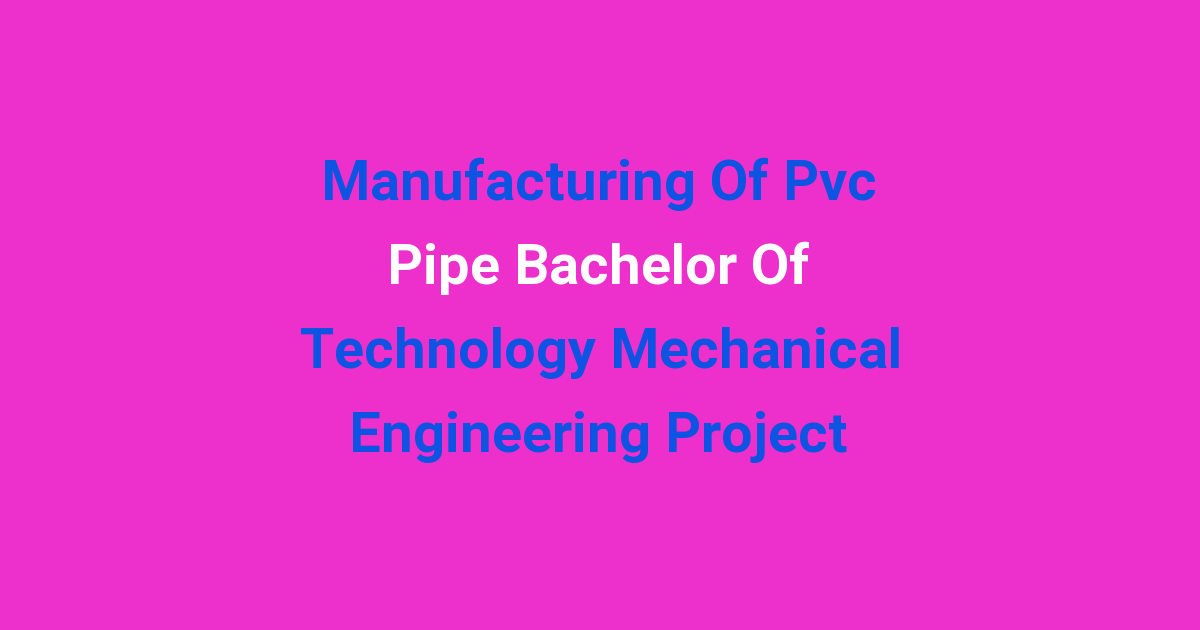Bachelor of Technology in Mechanical Engineering project focusing on the manufacturing of PVC pipes.
Manufacturing of PVC Pipe – Bachelor of Technology Mechanical Engineering Project
Introduction
The manufacturing of PVC pipes is a crucial aspect of the construction industry, as these pipes are widely used for water supply and drainage systems. PVC pipes are known for their durability, cost-effectiveness, and low maintenance requirements, making them a popular choice among engineers and contractors.
In this project, we will focus on improving the manufacturing process of PVC pipes by introducing new technologies and methodologies to enhance efficiency and quality.
Problem Statement
The current manufacturing process of PVC pipes involves extruding molten PVC resin through a die to form the desired shape and size of the pipe. However, this process has several limitations, including low production rates, inconsistent quality, and high energy consumption.
The traditional manufacturing process is labor-intensive and time-consuming, leading to increased production costs and reduced profitability for manufacturers. Additionally, the reliance on manual labor makes the process susceptible to human errors and inconsistencies in the final product.
Existing System
The existing system of manufacturing PVC pipes involves several steps, including mixing the PVC resin with additives, extruding the mixture through a die, cooling the extruded pipe, and cutting it to the desired length. This process requires skilled labor and expensive machinery, making it difficult for small manufacturers to compete in the market.
The quality of PVC pipes produced using the traditional manufacturing process is often inconsistent, with variations in wall thickness, diameter, and strength. This can lead to leaks, bursts, and other failures in the pipe system, resulting in costly repairs and replacements for customers.
Disadvantages
– Low production rates
– Inconsistent quality
– High energy consumption
– Labor-intensive process
– Susceptibility to human errors
– Variations in product quality
Proposed System
To address the limitations of the existing system, we propose introducing new technologies and methodologies to improve the manufacturing process of PVC pipes. This includes automation of certain tasks, such as mixing the PVC resin and additives, as well as implementing quality control measures to ensure consistent product quality.
By automating the manufacturing process, we can increase production rates, reduce labor costs, and improve overall efficiency. This will also help minimize human errors and variations in product quality, leading to higher customer satisfaction and reduced warranty claims.
Advantages
– Higher production rates
– Improved product quality
– Reduced labor costs
– Enhanced efficiency
– Minimized human errors
– Lower warranty claims
Features
Some of the key features of the proposed system include:
– Automated mixing of PVC resin and additives
– Quality control measures to ensure consistent product quality
– Enhanced production rates and efficiency
– Reduced labor costs and energy consumption
– Improved product durability and strength
– Lower maintenance requirements for PVC pipes
Conclusion
In conclusion, the manufacturing of PVC pipes is a critical process that requires careful attention to detail and quality control. By introducing new technologies and methodologies, we can significantly improve the efficiency and quality of PVC pipe production, leading to higher customer satisfaction and increased profitability for manufacturers.
The proposed system aims to address the limitations of the existing manufacturing process by automating certain tasks, implementing quality control measures, and enhancing overall efficiency. This will not only benefit manufacturers but also customers who rely on PVC pipes for their water supply and drainage systems.
Overall, this project demonstrates the importance of continuous improvement and innovation in the field of mechanical engineering, particularly in the manufacturing of essential construction materials like PVC pipes. With the right tools and techniques, we can revolutionize the way PVC pipes are produced, making them more reliable, durable, and cost-effective for a wide range of applications.

